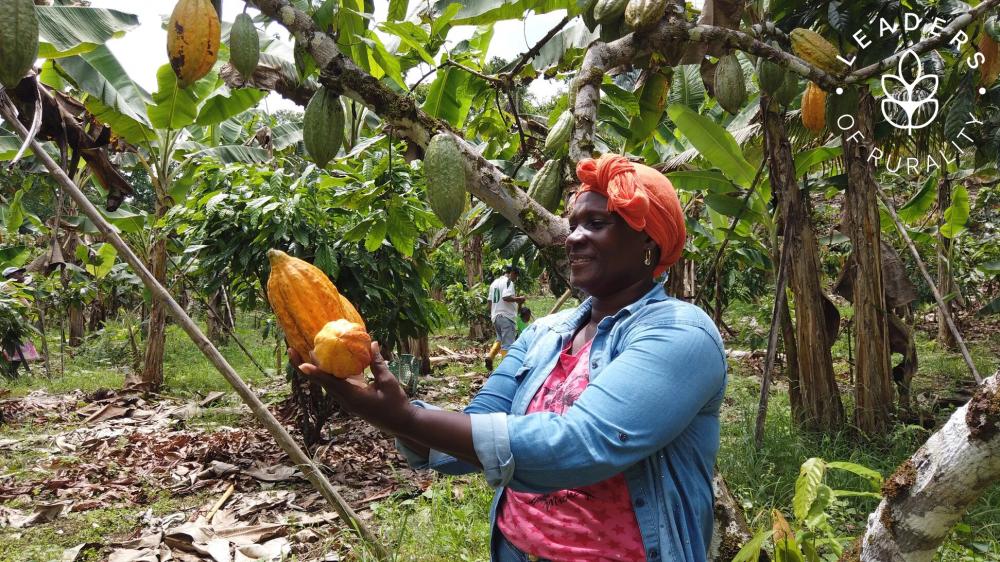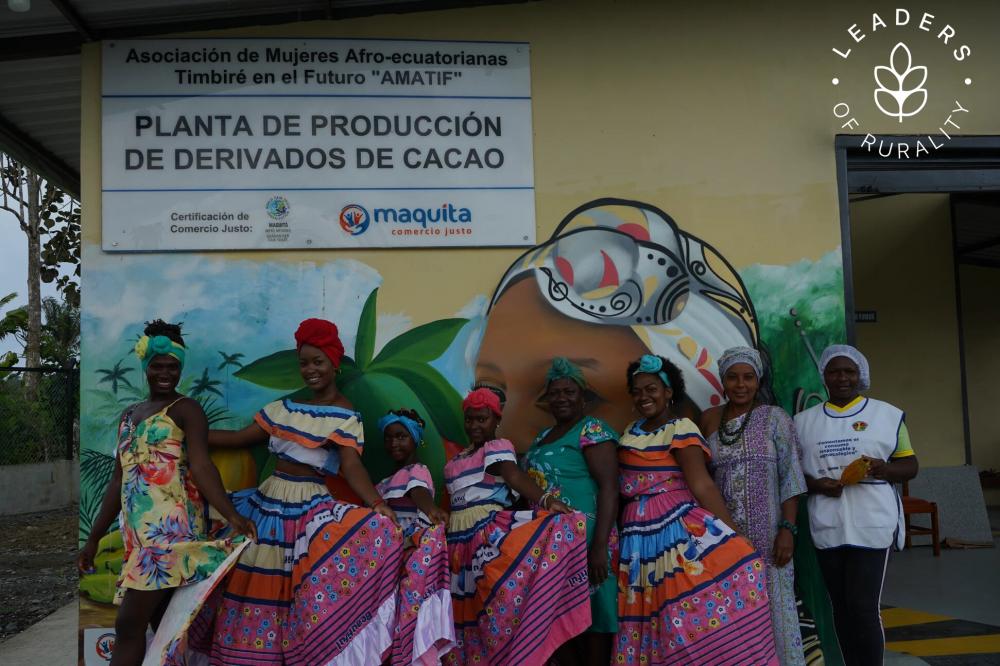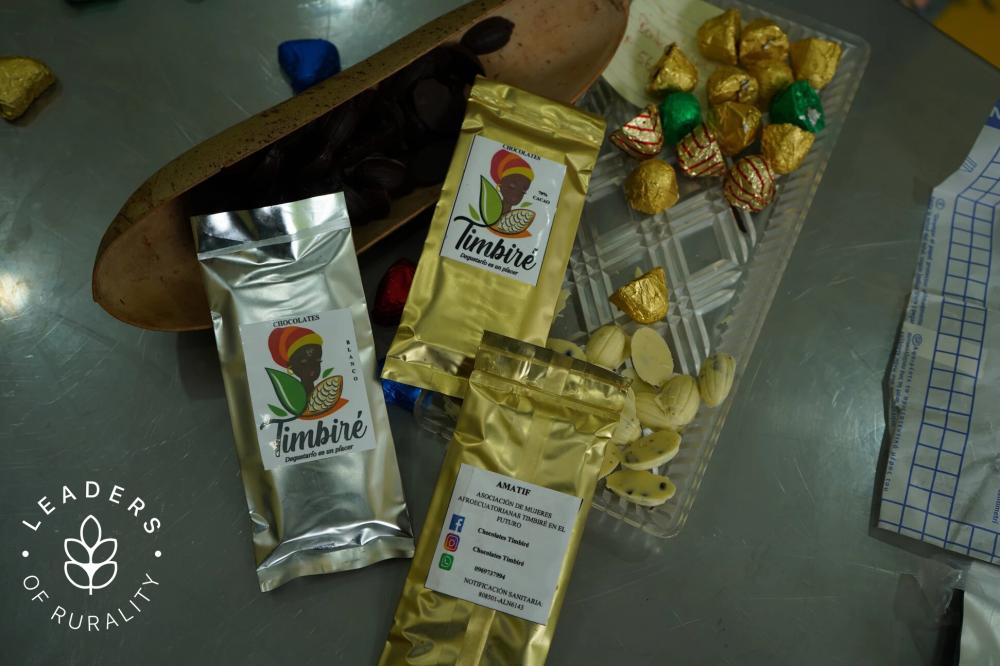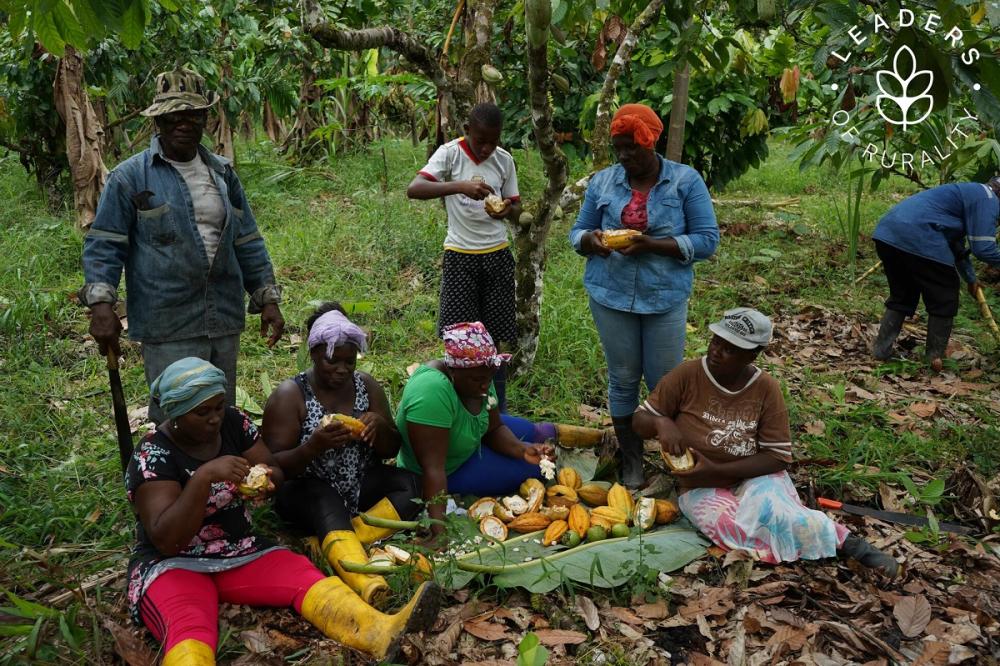The work of Valdez and of AMATIF serves as a positive example for rural areas in the Americas. The association has already established a cocoa processing plant that produces chocolate and other by-products that are sold throughout the province and plans to expand to international markets.

San Jose, 30 May 2022 (IICA).-Ecuadorian family farmer, Lorena Valdez, a co-founder of the Afro-descendant women’s association, Asociación de Mujeres Afroecuatorianas Timbiré en el Futuro (AMATIF)—a veritable engine of development for its small rural community over the last 15 years—was selected by the Inter-American Institute for Cooperation on Agriculture (IICA) as its latest “Leader of Rurality of the Americas”.
The “Soul of “Rurality” award, as it is called, is in recognition of Valdez’s work in organizing and empowering rural women, which has boosted the productivity and sales of the food produced in Timbiré, a community in the province of Esmeraldas, which is home to 2,000 people of predominantly African descent.
The IICA Leaders of Rurality award seeks to recognize and provide greater visibility to individuals who are playing a critical dual role, namely as guarantors of food and nutritional security and as custodians of the planet’s biodiversity, producing under all kinds of conditions. These men and women are leaving their mark and making a difference in the rural areas of Latin America and the Caribbean.
The work of Valdez and of AMATIF serves as a positive example for rural areas in the Americas. The association has already established a cocoa processing plant that produces chocolate and other by-products that are sold throughout the province and plans to expand to international markets. The AMATIF collection center enables the products to be marketed collectively, thus securing better prices.
IICA, which views agriculture as an instrument for peace and community integration, works with its 34 Delegations in the Americas to select the #Leadersofrurality.
The small farmer who fuses ancestral knowledge with the latest agricultural expertise
In 2007, when Lorena Valdez and eleven other women in Ecuador’s Timbiré community decided to create an association, they reflected on what they would like their future to be.
She recalls that, “We wanted to strengthen ourselves as women and to encourage the development of our families and community. Machismo rules here and many men found this difficult to accept. We decided to break down barriers and to empower ourselves in terms of the production, social and political processes in our community”.

Thus, they settled on the name, Asociación de Mujeres Afroecuatorianas Timbiré en el Futuro (AMATIF), which means Timbiré Association of Afro-descendant Women of the Future. It seeks to boost agricultural production, ensure community access to healthy food, enhance value addition and identify more profitable marketing outlets. Such has been its success that on 18 July, the association will celebrate its 15th anniversary as an engine for the collective development of this community in Esmeraldas, located 250 kilometers from the country’s border with Colombia.
The vast majority of the 2,000 inhabitants of Timbiré are of African descent and the main source of livelihood is agriculture. The area is warm, with lush landscapes bathed by the waters of the Santiago River, and it produces mainly cocoa, plantain and coffee. “I say that Timbiré is an extension of heaven. The people are warm and welcoming. And we also make the best chocolate”, says Lorena with a laugh.
The reference to chocolate is because AMATIF, which now consists of 26 members, owns a production plant for cocoa products. Through tireless work and sacrifice, the plant produces 500 bars of chocolate per week, in addition to sweets and different edible products.
Lorena explains that, “We are aiming to strengthen family farming, because many of us have our little farm with plantain, cocoa and a few fruit trees. Working as an association is critical, because the association also operates as a cocoa collection center and we process it into cocoa paste or sweets. We have also introduced innovations with new flavors, thanks to the wide variety of fruits grown here”.
The Timbiré women grow the world’s most sought after cocoa – fine and flavor cocoa, which is characterized by its rich flavors. They have preserved the seeds, thanks to the knowledge passed on from their parents and grandparents and they use organic inputs in their farming to control pests and diseases, thereby preserving their cultural legacy and protecting the environment.
“IICA is assisting us with training to improve the marketing of our products. We have already obtained the family farming seal and are working towards establishing the Chocolate Timbiré brand name, which has still not been registered”, Lorena tells us.

She also explained that, “Today we have registration certificates for six of the products that we produce. Right now we only sell them within our province, since we would need to satisfy additional regulations to sell them further afield. Everything that we do is with the aim of selling our products in large national and international supermarkets. I would love to see my chocolate in the United States and other countries. We know that our chocolate is good. It is already known locally, but we want it to be known internationally”.
A life tied to the land
Lorena Valdez is 46 years old and is married with five children. She comes from a farming family. “When I was a little girl, the family supported itself with cocoa and plantain. When it was time to reap, we would sell the cocoa to intermediaries and it would be enough to put food on the table. We would take the plantain to the city of Limones and trade it in the market for fish, coconut, crab, shrimp and freshwater crab, while we waited for the cocoa harvest”, she recalls.
When she was just 12 years old, she left the countryside and went to study in the port city of Guayaquil. At 22 she made a conscious and well-thought-out decision to return to her home town. “Those years in Guayaquil made me realize that the countryside is the place to live. It is a healthier and more peaceful environment that promotes greater well-being. Cities suffocate you and are too fast-paced. My first twelve years after returning to Timbiré, I was a community teacher and then I turned to agriculture and associative work.
The Timbiré land is collective community property, giving the farmers security over the land on which they live, which has been designated for food production. However, they also find it difficult to obtain credit, given that they have no individual titles for their farms.
“Some of the women who are members of the association are well educated and others only know how to read and write. Yet, all of us love our community and want to contribute to our sovereignty and food security. I also think it is interesting that there are eight women who now want to become members of AMATIF and they are all young. This shows that we value knowledge transfer to new generations and that people are still enthusiastic about agriculture”, says Lorena.
Through workshops and training, the women of AMATIF have grown and been able to meet their objectives. They have brought technical know-how and innovations to bear on their ancestral knowledge, which has allowed them to build their resilience against climate change and to remain productive even during difficult periods. They have gained the confidence to pick up a chainsaw, a lawnmower or a machete, which are tools that just a few years ago were reserved exclusively for men.

She insists that, “As women, we can do anything. We can contribute to the development of our home and to building opportunities for our community. It is the responsibility of those of us in the countryside to produce food for people in the cities. I am always trying to motivate other young people, telling them that life in the country is not only healthier and more peaceful, but it offers you opportunities for entrepreneurship and for financial development”.
“A farmer can sell their produce on their own, but an organization allows you to sell in volume, supplying a greater demand and obtaining better prices. If we work as an association, we will not be at the mercy of intermediaries. Not just one person, but the whole community will benefit”.
More information:
Institutional Communication Division.
comunicacion.institucional@iica.int
Photo gallery











